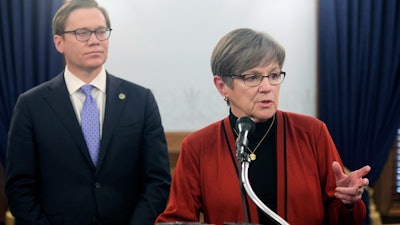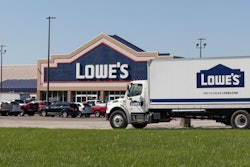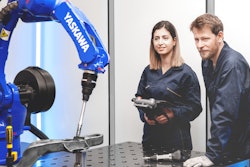
TOPEKA, Kan. (AP) — Kansas plans to give $304 million in taxpayer-funded incentives to a semiconductor company in its largest city to build a huge new factory, but the project won't go forward without funds the U.S. government has promised for rebuilding the nation's chip-making capacity.
Gov. Laura Kelly announced Thursday that Kansas has an agreement with Integra Technologies, based in Wichita, for a 10-year package of tax breaks and reimbursement of expenses. State officials said the new, $1.8 billion plant would cover 1 million square feet, have 2,000 employees and create 3,000 additional jobs among suppliers and other local businesses.
The announcement comes with the U.S. trying to reverse a loss of capacity for making the chips that are vital to smartphones, laptops and other modern-day conveniences, as well as automobiles and life-saving medical devices. Congress last year approved a measure that provides more than $52 billion in grants and other incentives for the semiconductor industry.
Kelly told reporters during a Statehouse news conference that the state's incentives are crucial to attracting the federal funds and "making Kansas an essential part of our country's national security efforts."
"This advanced manufacturing facility is part of a national push to restore our semiconductor industry so that U.S. workers and businesses can compete and win in the race for the 21st Century," Kelly said.
Integra CEO Brett Robinson would not say how much federal funding the company needs, only that there is "no commercially viable way" to do the project without it. He and state officials said other states were trying to attract the project, though they did not disclose the competitors.
"It's not just critical to the United States and to security, but it's critical to the supply chain," said Kansas Senate President Ty Masterson, a Wichita-area Republican.
President Joe Biden pushed Congress last year to boost the U.S. semiconductor industry, because of a shortage of chips made worse by the global coronavirus pandemic and concerns about competing with international rivals, particularly China. There's been a decades-long shift to cheaper-to-operate Asian chip plants, and the industry is now dependent on Taiwan, which China has long claimed as its own.
"If we were ever to lose, for a sustainable amount of time, access to the southeast Asian supply chain, what we just went through would pale in comparison," Robinson said.
Integra, founded in 1983, has about 500 employees in Wichita and Silicon Valley and describes itself as the largest U.S. provider of the last two major assembly and testing steps in the chip manufacturing process. The new factory is expected to pay an average annual wage of $51,000, about 46% higher than the state's average of roughly $35,000.
For Integra to receive its incentives, it must invest at least $1.5 billion in the new factory in the next five years and consistently provide the equivalent of 1,600 full-time jobs for 10 consecutive years.
The incentives are part of a program Kansas created last year to ramp up its efforts to compete with other states for new, large factories. Under that program, the state was allowed to offer up to $1 billion in incentives to a single company each in 2022 and 2023.
In July 2022, Kelly and other state officials announced that Panasonic Corp. plans to build a mega-factory to produce electric vehicle batteries for Tesla and other carmakers. The state lured the Japanese electronics giant's project to the edge of the Kansas City area with incentives worth $829 million over 10 years, the most the state has ever offered.
The law allowing the incentives required top leaders of the Republican-controlled Legislature to sign off any deal between a company and the state Department of Commerce, which is led by Lt. Gov. David Toland, a Democrat like Kelly. The legislative leaders gave their approval just minutes ahead of the announcement, after meeting in private with Kelly for half an hour to review the agreement, with no opportunity for public review or input.
The law also requires Kansas to drop its corporate income tax rates by half a percentage point for each mega-deal. If the Integra project goes forward, the top rate would decline to 6% from 7%, saving all corporations roughly $100 million a year.
While both mega-projects have had bipartisan support, some lawmakers are critical of promising such big taxpayer-funded incentives to a single firm.
"We have not written the checks for this first project and they're starting the second one without even knowing that it works," state Senate tax committee Chair Caryn Tyson, a conservative Republican from eastern Kansas, said before Thursday's announcement.






















